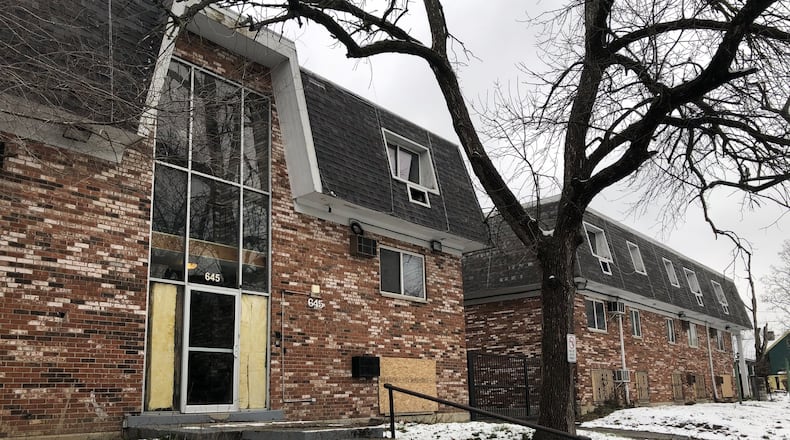The property was shut down years ago after operating as an illegal hotel/motel, city staff said.
Plan Board members and some neighborhood leaders said the amount of parking is troubling and they cannot support the developer’s plans until that and other details are better addressed.
“What you do here is going to have a long-term impact on everyone around you,” said Jeff Payne, a Dayton plan board member. “It’s serious business.”
MORE: Ohio workplace injuries decrease. But glass manufacturing is one of the most dangerous industries.
Mountain Lion proposed renovating empty apartment buildings at 633 and 645 W. Grand Ave., which the company bought in September for about $136,800, real estate records show.
Built in 1968, the multi-story buildings served as housing for decades. But in 2015, the city ordered the property to be shut down for illegally operating as a hotel/motel. The property had other violations related to safety, fire regulations and illegal fencing.
The property was a problem for the neighborhood even before it became a “no tell motel,” said Bill Marvin, president of the Five Oaks Neighborhood Association.
Trash littered the grounds and the property was unattractive and poorly maintained, speakers said.
But the new owners worked with the community and met multiple times with the North Central Priority Land Use board to develop and refine its housing plans, said Jennifer Lumpkin, planner with the city of Dayton.
The project would rehabilitate vacant structures, consistent with city’s overarching community development goals, and city staff believe the project would not detract from surrounding land uses, Lumpkin said.
MORE: Hundreds of Dayton shootings detected, but very few reported
City staff, however, recommended restricting the number of new apartments based on the amount of off-street parking.
Mountain Lion’s plan called for reducing the apartment density to about 56 units from 68.
The city said there should be 1.5 off-street spaces for every apartment, meaning 56 apartments requires 84 parking spaces.
The North Central Priority Land use Board recommended approval of the project if it met the city’s development standards, most importantly related to parking.
But the developer’s parking situation was questioned.
Kristine Bertrand, with Mountain Lion, said her company is under contract to purchase an adjacent property with plans to convert it into new parking. She also said she was working to acquire other nearby properties to create new parking.
Bertrand said her company would be willing to only rent out only as many units as it has off-street parking to support.
But plan board members and some neighbors said they did not believe the city could effectively police this requirement.
“What we’d ask is you table this until the applicant either reduces the size of the units they are asking for or finds additional parking,” said Dan Barton, with the Grafton Hill Community Development Corp.
Dayton’s zoning administrator said some of the parking assumptions in the development plan were unrealistic.
Grafton Hill is one of the city’s smost densely populated neighborhoods, with large, multifamily buildings that have insufficient parking and green space, said Eric Dye, vice president of the Grafton Hill Neighborhood Association.
There’s limited parking around Mountain Lion’s property, which means residents would have to park in the neighborhood and cross Grand Avenue, which is a busy street with fast-moving traffic, he said.
Dye said the project should be tabled until the developer’s plans better address parking and green space needs.
“We don’t see that effective for a multi-use structure that has variances from the 1960s that don’t meet the health and safety of our neighborhood,” he said.
Monica Snow, president of Preservation Dayton Inc., said the two buildings are intrusions in a historic district and the developer has no plans to upgrade their exteriors.
She said the best outcome would be to demolish the apartments and replace them with new construction that better fits into the neighborhood. “We do not have to accept recycling a substandard apartment building that is over-densely occupied for that particular site,” she said.
The Dayton Plan Board voted 3 to 2 to deny the developer’s request.
Plan Board member Matt Sauer, who voted against denying the request, said reusing existing buildings is a sustainable solution, and he said there are many apartment high-rises in the area with less off-street parking available.
Mountain Lion could return with a new zoning-change request if it submits a substantially modified plan, such as if there are new lots acquired and incorporated for parking.
About the Author


